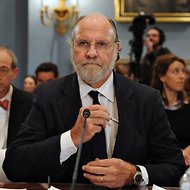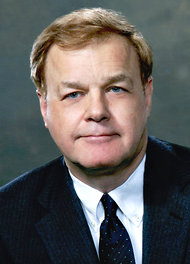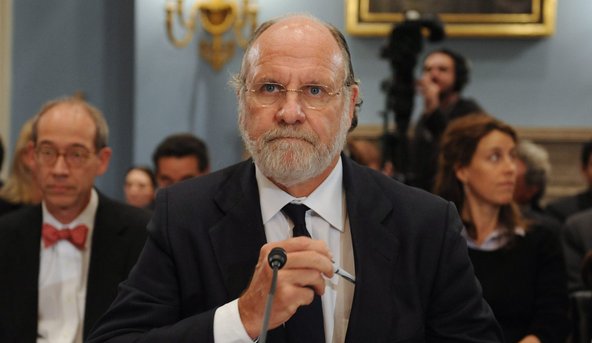 Michael Reynolds/European Pressphoto AgencyJon S. Corzine, MF Global’s former chief executive, testifying at a House hearing into the collapse of the firm.
Michael Reynolds/European Pressphoto AgencyJon S. Corzine, MF Global’s former chief executive, testifying at a House hearing into the collapse of the firm.
MF Global’s former chief executive, Jon S. Corzine, was gingerly questioned by the House Agriculture Committee for almost three hours on Thursday, in the end saying little enlightening about the firm’s collapse or the customer money that has gone missing.
It seems unlikely that anything at the hearing can be used against him by criminal and civil investigators, so in that sense the testimony was a victory for Mr. Corzine.
Rather than invoke the Fifth Amendment to protect himself, Mr. Corzine couched his answers with enough caveats and denials of specific knowledge that it would be nearly impossible to claim that he lied or misled the committee. He never even took a firm stand about MF Global’s demise, unlike Enron‘s former chief executive, Jeffrey K. Skilling, who loudly proclaimed he had acted properly when he ran the company – statements that came back to haunt him at his criminal trial a few years later.
In his prepared statement, Mr. Corzine pointed out that he did not have access to records and notes that would help his recollection, thereby giving himself an out in case he made any misstatements. He disclaimed responsibility for much of the firm’s daily operations related to the missing customer money, asserting that “even when I was at MF Global, my involvement in the firm’s clearing, settlement and payment mechanisms, and accounting was limited.”
White Collar Watch
View all posts
And he spread the blame around the firm for the decisions that resulted in its collapse into bankruptcy. Mr. Corzine pointed out that the decision to invest in European sovereign debt “was disclosed to the board of directors, the senior officers of the company, the company’s accountants and numerous outsiders.”
In response to questions from committee members, Mr. Corzine was hardly a font of information. Although he told Representative Renee L. Ellmers, Republican of North Carolina, “The buck stops here,” just being a chief executive is not a basis for any criminal or civil liability.
He denied having any responsibility for the missing $1.2 billion, about which he said in his prepared statement, “I simply do not know where the money is, or why the accounts have not been reconciled to date.” When pressed about whether customer money was moved around in the firm, he responded, “I never intended to break any rules,” and if any employee thought he directed use of the money, “it was a misunderstanding.”
Mr. Corzine’s legal strategy was clear: respond to questions, but say as little as possible while maintaining that MF Global was operated properly.
If there were violations, he did not know about them, and certainly had no intent to defraud. The firm’s demise appears to be largely chalked up to a growing lack of confidence in the markets that caused financing sources to dry up.
In other words: “Stuff happened, but it was not really my fault.”
In this initial phase, Mr. Corzine’s approach is primarily directed at damage control, which explains why he was unwilling to assert the Fifth Amendment because that would label him as someone who perceived himself as being aware of wrongdoing. He is scheduled to testify before additional Congressional committees, and so we can expect more of the same from him.
As long as the customer money remain missing, it will be difficult for Mr. Corzine to take a more aggressive stance in challenging the perception that there was criminal misconduct at the firm. For the time being, he is limited to appropriately apologetic statements about the losses suffered while denying he had any involvement in the missing customer money.
The larger question is whether the federal government will pursue any actions against Mr. Corzine. Both the Commodity Futures Trading Commission and the Securities and Exchange Commission have strict regulations on maintaining adequate financial records, and a chief executive can be held responsible for any violations.
I think there is a good chance of a civil enforcement action from one or both agencies that names Mr. Corzine, especially because those types of violations do not require proof of intentional misconduct. But that could be months down the road as investigators sort through MF Global’s records.
On the issue of potential criminal liability, the problem prosecutors will face is the same hurdle that has dogged investigations of executives at Wall Street firms involved in the financial meltdown – proving intent. Mr. Corzine stressed his ignorance, something usually not seen from a former governor, senator and co-chief of Goldman Sachs. But that is, in effect, what Thursday’s testimony emphasized, his lack of any knowledge of the firm’s operations that led to the loss of customer money or intent to mislead.
The investigation is still in an early stage, and a key to establishing criminal liability in any organization is to find those lower down the corporate ladder willing to provide incriminating information about senior management. Whether that type of witness exists in the ranks of MF Global remains to be seen, but once investigators are able to figure out how the customer money went missing, we may see criminal cases develop.
For now, Mr. Corzine appears to have passed the first public test by responding to questions without putting himself in a position to have his testimony used against him at a later time. With little concrete information, the others Congressional hearings will likely stay at a fairly general level that allows Mr. Corzine to deflect questions or plead ignorance — for now. But that may change as investigators dig deeper into the firm’s records and piece together what actually happened.
Peter J. Henning, who writes White Collar Watch for DealBook, is a professor at Wayne State University Law School.
Article source: http://feeds.nytimes.com/click.phdo?i=bcbe42d6ba2e00e173890c3641642a47


